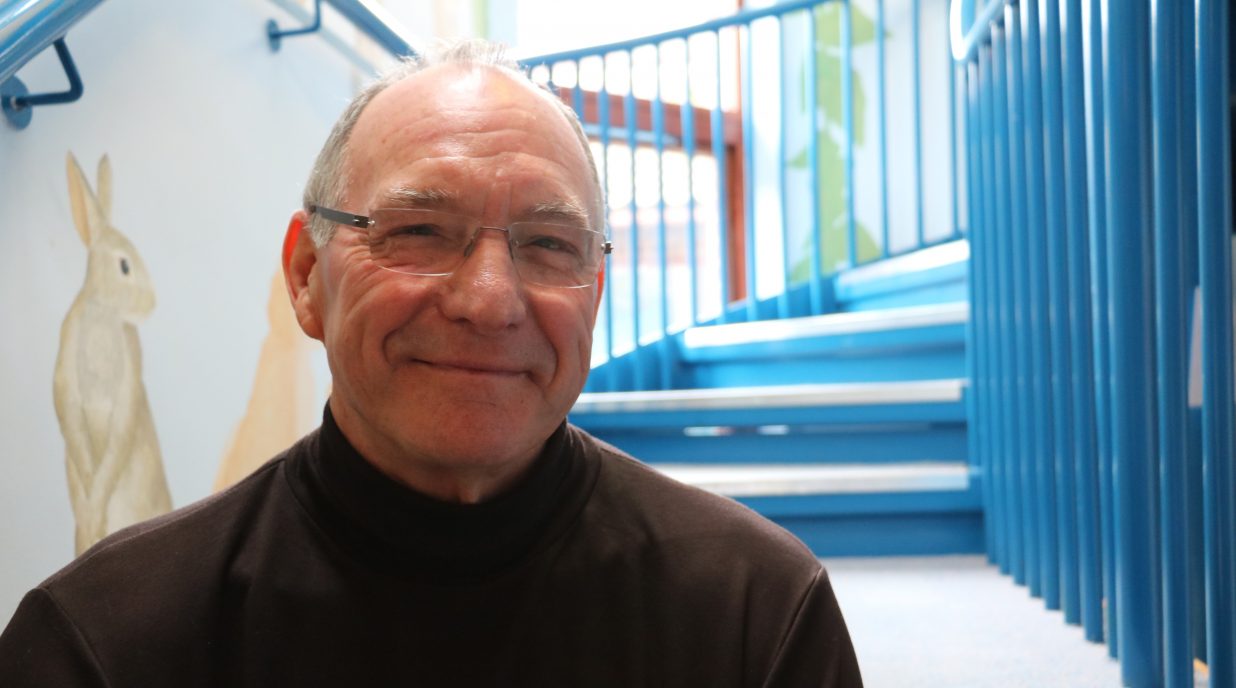Call our 24/7 advice line for health care professionals and families if you need support with symptom management and end of life care - 01284 766133.
Becoming a Hospice Neighbour
Hospice Neighbour, David, tells us why he enjoys spending time with people at the end of their lives.
Life can feel overwhelming for people living with or caring for a person experiencing dying, death and grief. That is when our Hospice Neighbours are on hand to offer companionship, practical support and a listening ear.
Hospice Neighbours is a community-based project led by a team of compassionate and caring volunteers who provide support to people across West Suffolk and Thetford.
Hospice Neighbours, Mary Andrew and David Winters, have visited Cedric and his father, Derek, in their home every week for the last 18 months.
Cedric, who cares for Derek at home, said:
“When you are in my situation you really appreciate any help you can get. Mary and David are a big help. They come and sit with Dad for an hour or so every week which means I can leave the house knowing that he is ok.
“Their help allows me to get out and have some space to myself. I usually go down to the local café, do the shopping or go to medical appointments.
“I am very lucky to have them both. It also gives Dad other people to talk to. Dad worked with horses most of his life and Mary and David have their own horses so they enjoy chatting about them.”
David Winter has been a Hospice Neighbour for a year. When he’s not volunteering with the Hospice he enjoys writing thrillers and American detective books. David first made contact with the Hospice in 2016 when his father was cared for by the Hospice during the end of his life.
David said:
“Dad was fortunate to have a bed in the Sylvan Ward during the last week of his life. He was in the most wonderful place with the most fantastic people looking after him.
“It made me realise how important the Hospice is to everybody and the amount of good volunteer work you can do away from the Hospice”.
As a thank you to the Hospice, David became a volunteer. After training and speaking to Hospice staff he enrolled as a Hospice Neighbour. During the last year he has helped three families, including Cedric and Derek.
David said:
“I supported someone who was in a bad way and went downhill quickly, but I could help his wife who was looking after her husband 24 hours a day, seven days a week, with the help of carers. She needed a break to do shopping and to have her hair done, so I used to sit with him or mow the lawn, anything to make their life easier. You have to be prepared to be flexible about what you do for people, you have to be practical, get involved a bit.
“The Hospice Neighbour role is varied – you could be with someone who is at the end of their life for quite a while, so you could be sitting with them and talking about items in the newspaper or visits from the family. It helps them an awful lot and for people who are not well and cannot speak at all, just being there is a help.”
The Hospice is always seeking volunteers to join a dedicated team of Hospice Neighbours. Volunteers need to be caring, flexible and willing to offer companionship and practical help to families during difficult times.
Glenn Hubbard, Hospice Neighbours Manager, said:
“Dying, death and grief are social processes, and we are really fortunate to have genuine engagement and warmth from Hospice Neighbours, and from local communities, who are ready and willing to be involved. This helps extend our reach to those people at the end of life, with hospice care seen as a behaviour and not necessarily a building.
We have also found that our Hospice Neighbours naturally make connections with people and build those local networks which really helps to provide the normality that people have said is so valuable to them.”
If you are unable to commit to becoming a Hospice Neighbour, as David said;
“You don’t have to be part of the Hospice or any organisation, just look after your neighbour next door or three doors along.
“When I was younger, living with my Grandma, we knew everyone for 20 doors around and we would help each other out. Nowadays people are a lot more insular and a lot of people don’t even know their next-door neighbour.”

